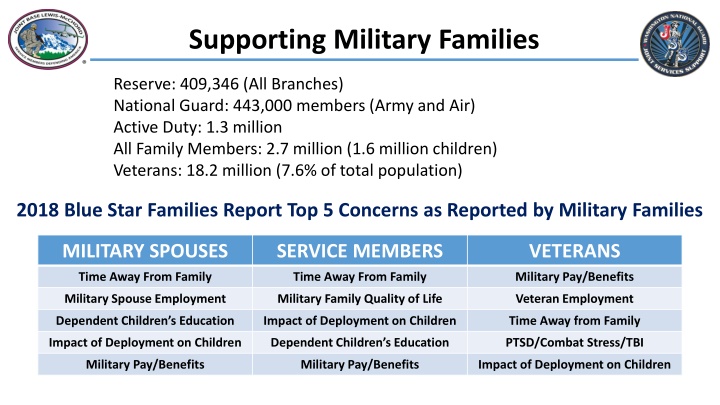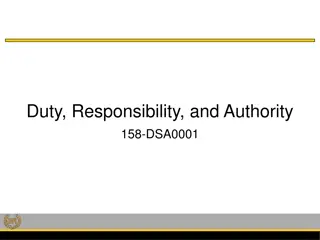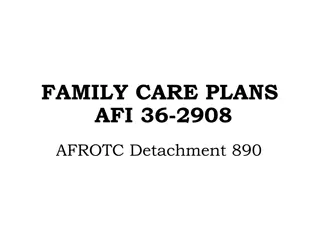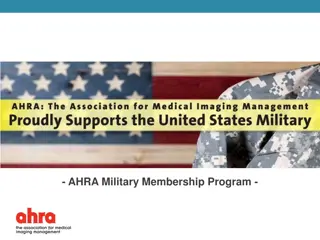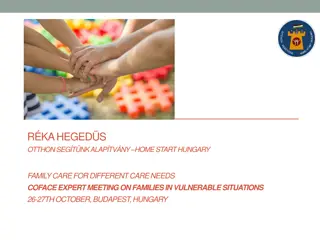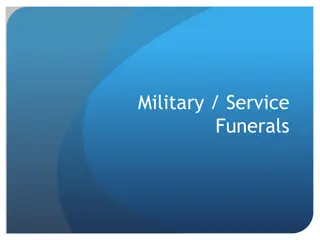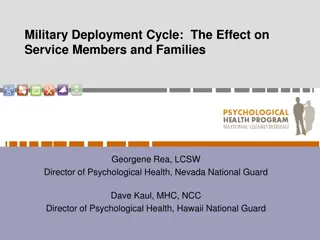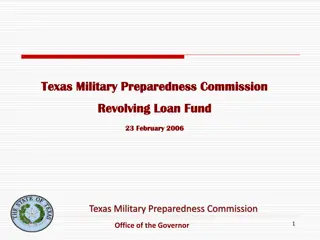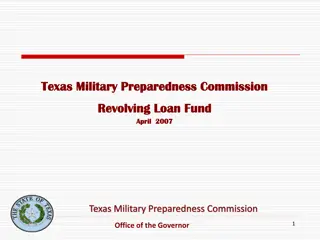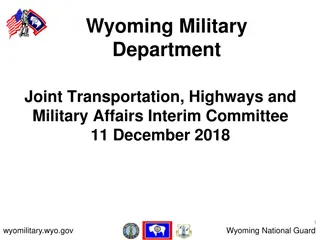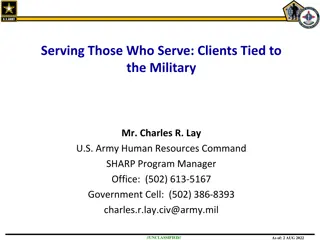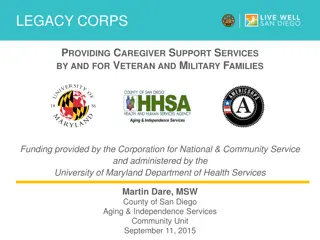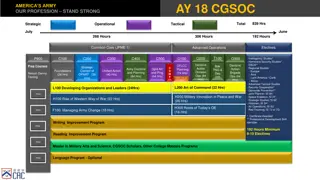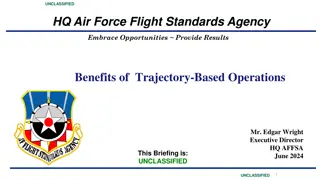Supporting Military Families: Challenges and Resources
Military families face various challenges related to deployments, affecting service members, spouses, and children. The impact includes mental health issues, stress, and concerns about family well-being. Resources such as counseling services, support centers, and programs aim to provide assistance to families navigating these difficulties.
Download Presentation

Please find below an Image/Link to download the presentation.
The content on the website is provided AS IS for your information and personal use only. It may not be sold, licensed, or shared on other websites without obtaining consent from the author.If you encounter any issues during the download, it is possible that the publisher has removed the file from their server.
You are allowed to download the files provided on this website for personal or commercial use, subject to the condition that they are used lawfully. All files are the property of their respective owners.
The content on the website is provided AS IS for your information and personal use only. It may not be sold, licensed, or shared on other websites without obtaining consent from the author.
E N D
Presentation Transcript
Supporting Military Families Reserve: 409,346 (All Branches) National Guard: 443,000 members (Army and Air) Active Duty: 1.3 million All Family Members: 2.7 million (1.6 million children) Veterans: 18.2 million (7.6% of total population) 2018 Blue Star Families Report Top 5 Concerns as Reported by Military Families MILITARY SPOUSES SERVICE MEMBERS VETERANS Time Away From Family Time Away From Family Military Pay/Benefits Military Spouse Employment Military Family Quality of Life Veteran Employment Dependent Children s Education Impact of Deployment on Children Time Away from Family Impact of Deployment on Children Dependent Children s Education PTSD/Combat Stress/TBI Military Pay/Benefits Military Pay/Benefits Impact of Deployment on Children
Deployment by the Numbers The Service Member Nearly 20% of service members in Iraq and Afghanistan experience acute stress, depression, and/or anxiety. The Spouse Multiple and prolonged deployment also has an effect on spouses, with 36.6% having at least one mental health diagnosis compared to 30% whose spouses were not deployed. +6.6% The Children More than 2 million American children have had a parent deployed at least once. About 30% reported feeling sad or hopeless almost every day for 2 weeks during the past 12 months. Nearly 1 in 4 reported having considered suicide. 37% of children with a deployed parent reported that they seriously worry about what could happen to their deployed caretaker.
Deployment Effects on Children Infants, Toddlers and Preschoolers They don t understand deployment, but feel the effects. Higher Emotional Reactivity Anxiousness Depression Somatic Complaints Withdrawal Separation Anxiety with remaining parent Temper Tantrums Change in Eating or Sleeping Habits School Age Children Studies show the at-home parent s level of stress is the most significant predictor of a school-age child s psychological well-being during a parent s deployment. Researchers also discovered that children with parents who were younger, had been married for a shorter period of time, and were junior enlisted rank were at a higher risk of psychosocial problems. Teens Anxiety about deployed parent s wellbeing Decline in academic performance More likely to exhibit increased responsibility and maturity
Deployment Resources Behavioral Health Resources Vet Centers across the state Military One Source Give an Hour-https://heroescare.org/partners/give-an-hour/ Military Family Life Consultants Located at Military Family Life Centers and Youth Facilities https://www.militaryfamily.org/info-resources/deployment/ Children Resources 4H ASYMCA Boys and Girls Clubs Our Military Kids (as seen in video) Dolls, Bears, bedtime stories, reading books, Sesame Street Workshop and more. JSS - 10 Offices across the state Military Family Life Centers at most installations
Spouse Education and Employment - Active duty military spouses face a 24% unemployment rate - Over 31% are working part-time even if they would prefer to work full-time - Around 63% are Underemployed and earned 26.8% less in wage and salary income than their non-military spouse peers Barriers - Interview Bias military spouses will move - Employment Gaps - Never ahead comfortable, promoted, move start over - Disproportionately Affected by Occupational Licensing Requirements - 40% have a college degree, 34% pursuing a degree
Spouse Education and Employment Companies should strive to hire more military spouses because: They are diverse -- most are female and represent wide ethnic and cultural diversity. They are highly educated, hardworking and adaptable. They are customer-focused. Because they re competent, adaptable, and highly motivated With flex work on the rise and a skilled worker gap, their cross-group collaboration and communications experiences make them an ideal fit.
State Backing Military Spouses Executive order 19-01 Signed 13 May 2019 by Governor Jay Inslee *Washington State recognizes that military spouses include any person currently or previously married to a military service member during the service member s time of active, reserve, or national guard duty. 1) Washington State Military and Transition and Readiness Council (WSMTRC) will coordinate and support collaboration on career assistance for veterans, transitioning service members, Reserve and National guard members, and military families between federal, state, and local agencies, non-profit organizations, and businesses. 2) Data Sharing and Evaluation 3) Veteran and Military Spouse Owned Businesses 4) Hiring Campaigns - ESD, DVA and Commerce partner to promote employment of military and spouses 5) Expedited Credentialing
Executive order 19-01 Signed 13 May 2019 by Governor Jay Inslee 6) Agency Veterans and Military Spouse Employment Plans Each executive cabinet agency shall develop annual plans to increase the employment representation of veterans and military spouses. 7) EEO agencies review to ensure screening and selection tools do not exclude transferrable military and military spouse employment skills and experience. Agencies shall not eliminate Military spouses from consideration due to employment gaps or varied occupation history. 7) State Employee Resource Groups to include military spouses
WA Legislation State Legislation Passed in 2019 Session - ESHB 1138 Concerning the armed forces exceptions for giving notice of termination of tenancy - SHB 1197 - Concerning gold star license plates - SHB 1210 Allowing nonresident children from military families to enroll in Washington's public schools prior to arrival in the state - HB 2058 Concerning Purple Heart license plates - SB Creating an account to support necessary infrastructure near military installations Potential Issues for the 2020 Session - Joining the nurse licensure compact - Increasing employment opportunities for military spouses - Establishing the military families access to child care and early learning supports program
WA State Military Transition and Readiness Council 2 Main Goal workgroups 1. Military Spouse Employment - Improving communication channels and web resources - Data Sharing - Supporting employers to become military spouse friendly - Promoting opportunities for flexible work - Promoting availability and access of childcare 2. License & Certification Portability - - Marketing/Advertising license and certification information - Streamlining license and certification process - Expedited transfer of licenses and certificates
WA State Military Transition and Readiness Council Communities of Practice 1. Employment focus on websites and communication, promoting veterans at work certification program SHRM 2. National Guard/Reserve Launched a pilot with ESGR with an employer symposium in Vancouver, WA . 3. Higher Education developing resources to promote military cultural competency on campuses. 4. Apprenticeship / Career Connected Learning Community of Practice providing briefings for TAP counselors and DVOP s around state on available apprentices and resources.
Military Spouse Economic Empowerment Zones (MSEEZ), launched 2018 A grassroots effort to combat the economic impact that military spouse unemployment and underemployment has on the 21st century military family. Facilitates collaboration between local and national employers, educational institutions, community resources, private and public sector partners, resulting in a robust employment network for military spouses. - Creates a network of employers committed to train, hire network and connect military spouses to career opportunities. - Creates an integrated digital platform allowing military spouses to upload resumes in Career Spark and view job postings by vetted employers and provide employers access to review jobseeker resumes and post job opportunities. Seattle: June 4, 2018 | Olympia: September 25, 2018 | Spokane: September 27, 2018 State of Washington: October, 2018 Became the First Statewide Effort
Programs Hilton Honors Military Program The Hilton Honors Military Program provides up to 100,000 hotel points to eligible Transitioning Service Members and Veterans to support needed travel for verifiable employment related activities, such as a job search, training for a new job, or finding housing. Onward to Opportunity https://ivmf.syracuse.edu/onward-to-opportunity/ - FREE industry-recognized certifications with exam fee & courses included - ONE Time participation for Active Duty, Veterans (honorable and 180 days service), National Guard/Reservists in part-time status (if full time same as Active Duty), Spouses of active duty, eligible veteran and member of National Guard/Reserve currently serving. - Over 30 courses available in 3 in-demand career tracks: PMP, CAPM, Six Sigma Green Belt, aPHR, PHR, SPHR, Customer Service, Call Center, IT
Washington Paid Family & Medical Leave Act As it pertains to Active Duty Military Benefit begins January 1, 2020 State wide insurance program for all workers except federal and active duty military members Active Duty Family (spouses, children, parents, step-parents, in-laws, grandparents, grandparent in-laws, siblings) Up to 12 weeks partial pay leave (16-18 weeks in some extreme circumstances) to: Take leave during your member s R&R Spend time together during reintegration Attend military ceremonies Deal with short notice deployments Take care of a family member injured in combat or during active duty service (All) Your or family members injury or illness, maternity, paternity (birth, adoption or foster) Weekly benefit ranges from $100-$1000 (the less you make the higher the % of your pay you get up to 90%)
Childcare Military Childcare - The Department of Defense (DoD) supports the largest employer- sponsored system of high-quality child care in the country. Through accredited child development centers (CDCs),family child care (FCC) homes, youth programs, and other after- school programs, the DoD provides care to over 174,000 military children aged 0 through 12 years. Quality Accredited Care (daytime) Not enough providers for demand Childcare Aware of America- Childcare fee assistance programs for military families who do not have access to on-base care (not available, centers are full). Ongoing expressed needs drop-in care, evening care
Finances - 65% of military families experience financial stress - About 23,000 military families rely on food stamps - Nearly 1 in 4 children at DOD schools are eligible for free meals - Military and veteran families have a hard time getting ahead financially 60% do not have enough savings to cover three months of living expenses without income. Financial Resources Professional Financial Counselors Service Members Relief Act WA State Attorney Generals SMRA Installation Financial Resources and Programs counseling, budgeting, car/home buying, saving, investing, emergency assistance programs American Red Cross Operation Homefront American Military Family PTSD or TBI
Thank You for Your Service Thank You for Serving those who Serve! Carl N. Steele, Director, Joint Services Support, carl.n.steele.civ@mail.mil Kimberly Fallen, Employment Readiness Manager, Joint Base Lewis-McChord, Kimberly.d.fallen.civ@mail.mil
